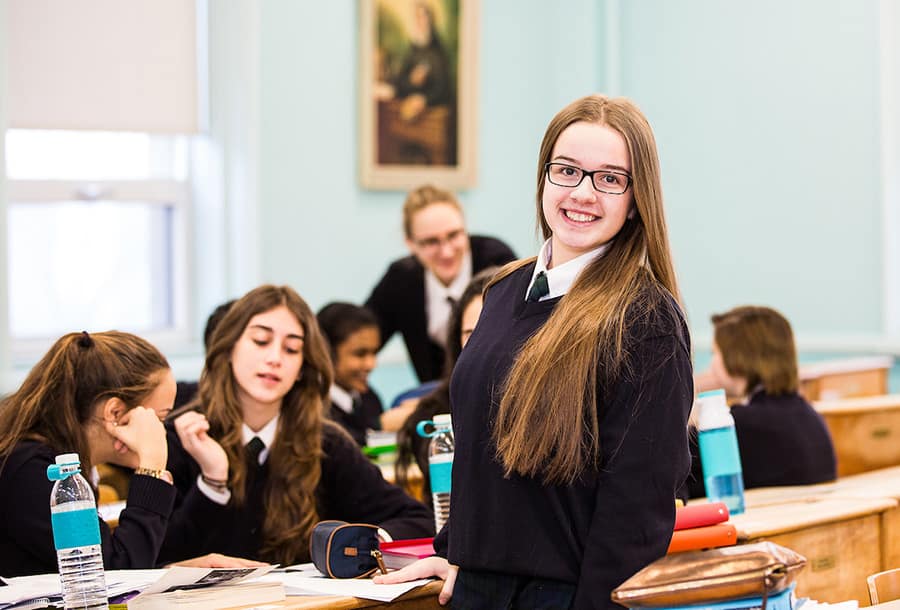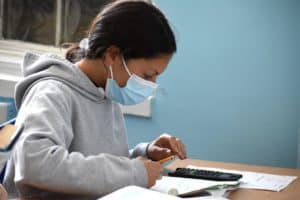Grade 8 (Sec. II)
Offered in French for all students.
- Drawing using pencils, markers, pastels, watercolor, gouache...
- Perspective, relief and three-dimensional work will be targeted.
- Using classical and contemporary artworks as inspiration, students will create their own works. They will learn not only to appreciate works of art but to create their own artistic vision.
The English Language Arts program promotes the love of learning by encouraging students to deepen their appreciation of literature and their understanding of language encountered in media texts. Students engage in open and respectful discussion of a wide range of ideas, including major ethical and moral dilemmas faced by humankind. The choice of literature and the topics of discussion and debate encourage intellectual development and a habit of reflection. Emphasis is placed on the writing process as well as the fundamentals of language: vocabulary development, grammar, and syntax. Students continue to learn and practice different forms of creative writing and the five-paragraph essay.
This course seeks to contextualize the basic ethical, moral and religious issues facing contemporary society through an understanding of the key issues of 1) personal freedom and autonomy and 2) social tolerance. Through the lenses of contemporary ethical, moral and religious issues and a multi-faith approach, students will learn how to develop their ability to think critically about ethical and moral issues, and assume the responsibilities of citizenship in a modern, multi-faith society.
Although multiple religious traditions will be studied, special focus will be placed on Christianity with emphasis on the Roman Catholic religious tradition and its impact on the development of modern Quebec society. Additionally, there will be a brief examination of the history and traditions of the Order of the Sacred Heart, the Five Goals of All Sacred Heart Schools, and an in-depth examination of Goal 5: Personal Growth in an Atmosphere of Wise Freedom.
Students are called to adopt a positive attitude with regard to the language and culture, and to master written and spoken French. They are encouraged to reflect on the language and become aware of its role in learning, structuring their thoughts and developing their imaginations. They are invited to discover the pleasure of mastering the French language and to understand the different cultures It represents in order to better situate themselves in the linguistic and cultural diversity of the contemporary world.
In high school, students learn to pay increasing attention to the interaction between the various communication elements of a situation and their impact on the meaning of texts. They increase their understanding of the intention behind texts they hear, read or watch, which helps them understand the meaning. They also learn to communicate their message effectively in a framework of authentic, varied and meaningful communication situations.
In high school, students deepen the skills acquired previously, and develop further knowledge of the language, learning in increasingly varied contexts where they must demonstrate increasing autonomy. In addition to enriching their vocabulary and their repertoire of cultural symbols through diverse current and literary texts of increasing complexity, they develop their ability to make use of situation-specific knowledge as well as French phonetics and grammar. They also learn to use a system that allows them to develop their skills in French and their competencies by interacting, reading or writing texts in that language.
This course is taught over a two-year period and its emphasis is on Territory interpretation and human dependency on specific territories. These include: Urban, Agricultural, Forest, Protected and Native. By encouraging students to look at territories from a geographic perspective, this course helps to make today’s world more intelligible to them. Students examine the relationships human beings have with space, and in so doing they acquire the tools and language of geography and learn about the concepts needed to resolve territorial problems.
The purpose of this two-year programme is to use the historical method to examine and interpret social phenomena from a historical perspective by acquainting students with past civilizations through the study of everyday life, social customs, and religious practices. Secondly, we raise the students’ consciousness of citizenship through the study of basic political concepts such as monarchy, democracy, dictatorship and empire as well as the winning of civil liberties.
Students in Advanced French are exempt from this course.
The global objective of this course is to gain knowledge and develop an understanding of Quebec culture and civilization. Learning activities will focus on a collaborative approach. In teams, students will achieve the course goals through research, reading, listening activities, reports and group discussions. Learning activities will culminate in the production of documents, posters, booklets, or oral presentations, interviews, and skits.
Regular: Secondary II focuses on sequences, rates, ratios, percent and an understanding of proportionality. The concepts of variables and algebraic expressions are also introduced as well as solving first-degree equations. The geometry component focuses on the fundamental elements of circles and polygons. For probability, students look at random experiments and the probability of an event.
Accelerated: In the accelerated class, topics from both Secondary 2 and Secondary 3 will be covered throughout the year. This course will first give a good foundation in proportional reasoning. The concepts of algebraic expressions and first-degree equations and inequalities will be reviewed and/or covered. This will lead into linear functions and rational functions. The geometry component focuses on circles, and on surface area and volume of solids. For probability, students look at simple random experiments, experiments with multiple steps, and the probability of an event. Finally, in statistics students will analyze one-variable distributions using measures of central tendency and measures of dispersion, and by grouping data.
This course is designed to further the playing ability of students after beginning instruction. Students will improve technical abilities, critical listening skills, ensemble work habits, and will expand their encounters with various styles and periods of music. Opportunities for instrument specific learning will continue throughout the year.
This course supports academic skills, social emotional, mental, physical and spiritual health of the students. It examines good decision-making and includes appropriate topics for all grade levels.
In Secondary II, the course includes workshops about body positivity, self-efficacy, SMART goals, digital citizenship, healthy relationships, sexual health, and more.
Students will learn the fundamental skills, strategies and regulations involved in a variety of sports, games and activities. Students will learn about adopting a healthy and active lifestyle through ongoing health activities, assignments and discussions. The health focus for the year will be “Nutrition”.
The Secondary II Science and Technology program aims to help students develop the necessary knowledge, skills, and attitudes necessary for scientific and technological literacy. The course will focus on the Material World and the Technological World.


